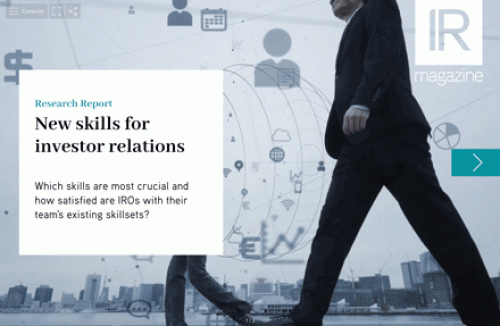Around 800 people generate the energy of 8,000
This morning PR Newswire Brazil president Marco Franca gazed from the window at an urban river stagnating beneath an unseasonably perfect blue winter sky.
‘Brazil is in the doldrums,’ he pronounced. ‘Things are really slowing down here.’
Just behind him, though, in the conference space of the São Paulo World Trade Center, thrummed one of the world’s most energetic IR conferences, which wrapped up today.
‘Year after year we’ve seen this event getting stronger and stronger. In the high times and the low times, this place is packed,’ Franca declared of Brazil’s 14th annual investor relations conference put on by ABRASCA, the country’s listed companies association, and IBRI, its IR society.
Consider that with just over 500 listed companies, compared to around 5,000 in the US, Brazil fielded 800 conference attendees, well over half the 1,350 that attended NIRI’s annual conference in Seattle last month. Not to mention 38 members of the press keenly following the action. No insult to the US IR community, but Brazil’s is punching many times above its weight.
Luiz Fernando Rolla, IBRI’s president and Cemig’s award-winning chief finance and IR officer, says the crises of the past 12 months gave IROs a lot to talk about at the conference.
‘The challenge today is that the market will move away from the turbulent times we’re in now. The prospects for new IPOs and new opportunities to approach investors are great opportunities for IR professionals,’ Rolla remarks.
In the meantime, Brazil’s IROs, like their peers around the world, are dealing with challenging macro conditions. ‘We’re still in crisis, and unfortunately we haven’t seen all the consequences,’ said Maria Helena Santana, president of Brazilian market regulator CVM, in the conference’s opening keynote speech on Monday.
‘The effects on capital inflows to our markets are very intense,’ Santana said. ‘The retraction of foreign investors and the difficulties they’re facing in their countries of origin have imposed a moment of unreasonable paralysis in our market, which is a shame.’
So what explains the record turnout at this IR conference? Franca suggests it starts with a young crowd of IROs hungry for knowledge combined with a concentration of company headquarters in São Paulo. Add to that the enormous effort (and clearly expense) that the many service providers pour into the exhibition space.
Extra zest came with last night’s IR Magazine Brazil Awards, at which Kroton Educacional, a R$2.5 bn private education company, took the lion’s share of prizes, sharing the spotlight with perennial winners like Vale, Cemig and Natura, as well as this year’s large-cap grand prix winner, Localiza Rent A Car.
The awards are taken very seriously here, in part due to the weight carried by the investor perception study from Fundação Getulio Vargas, a highly respected educational institution. Each year IROs hotly anticipate the results, with some of their bonuses depending on them.
Much talk at the conference was devoted to IBRI’s soon-to-be-unveiled IR certification program. After more than two years of work the program is on track to begin in December.
‘Certification will help companies recognize the good professionals in the market,’ Rolla says. ‘It will have strategic importance and give IROs tools and skills to contribute to the development of the capital market.’
Meanwhile, IBRI is still occupied with being an advocate for corporations in the Brazilian market, working with CVM as well as Bovespa, the exchange. ‘We are listened to. That’s the best thing,’ Rolla says. ‘They consider us to be a great contributor to the regulation of the market.’
Anyone who has experienced a vibrant IBRI conference, with crowds of information-hungry young IROs rubbing shoulders with older stalwarts, investors and service providers from near and far, would agree: this is an IR community that cannot be ignored.










